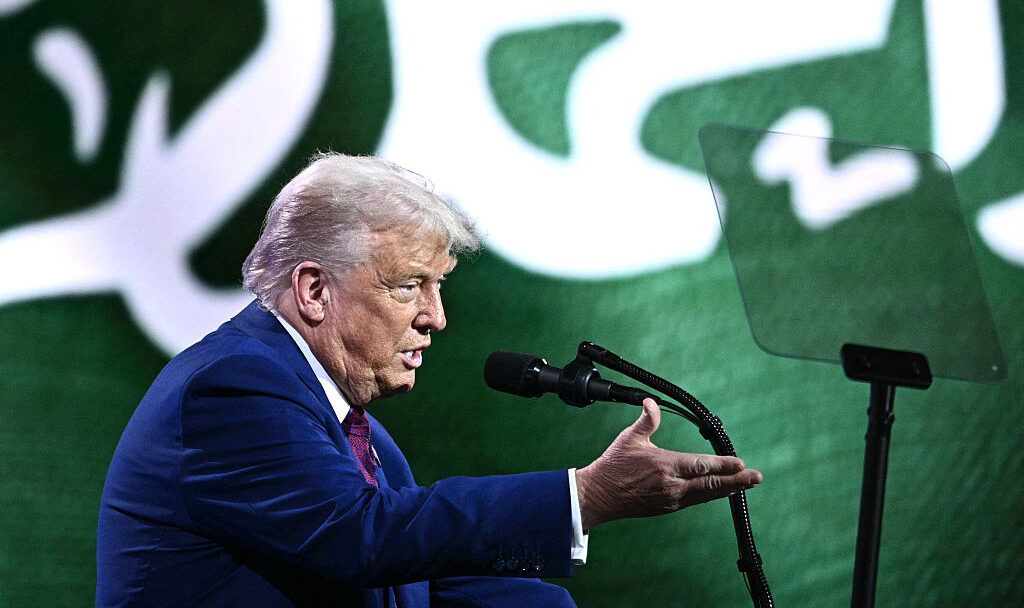Trump’s Clean Break With the Interventionists
At Riyadh, the president’s peacemaking rhetoric and his policies finally seemed aligned.

President Donald Trump sounded ready to make a clean break with his party’s most reflexive hawks in the first big speech he has delivered overseas during his second term.
“The so-called nation builders wrecked far more nations than they built, and the interventionists were intervening in complex societies that they did not even understand themselves,” he said in Riyadh on Tuesday.
Trump’s actions may be lining up with his words. He has recently announced a halt to the bombing of the Houthis in Yemen, the end of sanctions on Syria, the removal of a national security advisor seen as less than fully on board with his talks with Iran, and is otherwise trying to prevent another regional war in the Middle East.
“The gleaming marvels of Riyadh and Abu Dhabi were not created by the so-called ‘nation builders,’ neocons, or liberal nonprofits like those who spent trillions and trillions of dollars failing to develop Baghdad, so many other cities,” Trump continued.
“Peace, prosperity, and progress ultimately came not from a radical rejection of your heritage, but rather from embracing your national traditions and embracing that same heritage that you love so dearly,” he said. “You achieved a modern miracle the Arabian way.”
It has been clear for a decade that, unlike much of the conservative foreign-policy establishment that once ran the Republican Party, Trump believes that what have come to be called the forever wars have destroyed far more than they have conserved. He has made more progress in his second term than in the first displacing that establishment.
But it hasn’t been perfect. This White House does not speak with one voice on foreign policy. And Trump has verbally aligned with the peacemakers before only to bow to the hawks on substantive policy positions. Like Barack Obama before him, Trump also faces an electorate that is weary of war but not sure it is ready to take the risks of retrenchment.
For its part, the Beltway foreign-policy establishment will more readily condemn perceived errors of omissions than ill-conceived interventions.
Even now, the wars in Gaza and Ukraine have proven more difficult to wind down, for reasons hardly limited to domestic political considerations.
But it is possible that Trump now sees that he cannot achieve his desired goals while playing policeman of the world in faraway neighborhoods we don’t really know.
“The birth of a modern Middle East has been brought by the people of the region themselves, the people that are right here, the people that have lived here all their lives, developing your own sovereign countries, pursuing your own unique visions and charting your own destinies in your own way,” Trump said of the region in which the nation-builders’ dreams have most often gone to die in recent years.
Trump is banking on extremely flawed governments to make possible his vision for peace in the Middle East, a bet that has frustrated many of his predecessors.
Yet Trump also understands the limits of moral suasion in dealing with or motivating these rulers, castigating the Western experts “giving you lectures on how to live or how to govern your own affairs.”
“In recent years, far too many American presidents have been afflicted with the notion that it’s our job to look into the souls of foreign leaders and use U.S. policy to dispense justice for their sins,” Trump said. “I believe it is God’s job to sit in judgement — my job [is] to defend America and to promote the fundamental interests of stability, prosperity, and peace.”
He included Iran in this, though he remained adamant that Tehran will not acquire nuclear weapons. “I am here today not merely to condemn the past chaos of Iran’s leaders, but to offer them a new path and a much better path toward a far better and more hopeful future,” Trump said.
This will be a tall order. Trump may be ready to chart a different course, but peacemaking comes with its own set of challenges.
Subscribe Today
Get daily emails in your inbox
Last month Trump made a revealing comparison between his first and second terms.
“The first time, I had two things to do ‒ run the country and survive; I had all these crooked guys,” Trump told the Atlantic magazine in an interview published on April 28. “And the second time, I run the country and the world.”
Running the world is a difficult, perhaps impossible, task, even for its most powerful man.